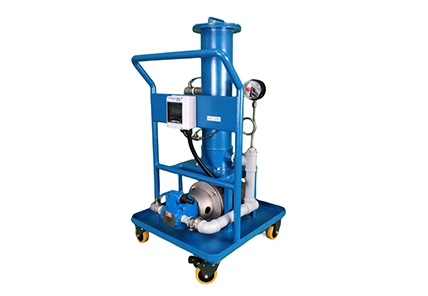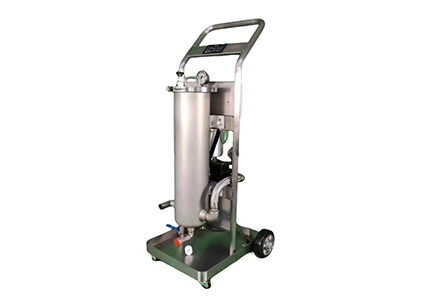La purificación del aceite lubricante desempeña un papel en entornos industriales para mantener la eficacia y la durabilidad de las operaciones de maquinaria. En las industrias de lubricantes para minimizar la fricción y mantener una funcionalidad suave, se’ Es esencial para hacer frente a los contaminantes, como el agua y las partículas sólidas, que pueden comprometer la calidad del aceite, lo que puede causar deterioro del equipo o problemas de rendimiento. El Nuestroun El sistema de filtración KORS 308 C está especialmente diseñado para eliminar la humedad y las impurezas de los aceites. Esto subraya la necesidad de sistemas de purificación capaces de cumplir con estrictos requisitos de limpieza.
Eliminar estas sustancias del aceite a través de sistemas de purificación mejora significativamente el rendimiento de los lubricantes y ayuda a prolongar la vida útil tanto del aceite como de la maquinaria que soporta. El sistema Ourun KOR106 C proporciona ventajas a los procesos industriales al eliminar eficientemente las impurezas del aceite para prevenir fallas en los equipos hidráulicos y aumentar la fiabilidad operativa al tiempo que se prolonga la vida útil de la maquinaria. Además, el aceite lubricante limpio reduce el tiempo de inactividad. Ahorro en gastos de mantenimiento, lo que lo convierte en un elemento esencial de las actividades industriales.

Factores clave que afectan al proceso de purificación
Muchos aspectos afectan lo bien que funciona la purificación del aceite lubricante, como el tipo y la cantidad de impurezas en el aceite que son factores cruciales a considerar; por ejemplo. La eliminación del agua libre se puede hacer efectivamente a través de técnicas de deshidratación al vacío, mientras que la eliminación del agua disuelta requiere métodos más sofisticados que se emplean en su lugar. El Ourun KORS 308 C destaca por su capacidad para lograr la eliminación del agua de las burbujas de agua y aceite libres, así como la eliminación de hasta un 80 por ciento de agua disuelta.
Otras consideraciones importantes implican el grosor del aceite y dónde se utiliza en operaciones. Los aceites con grosor requieren sistemas fuertes que puedan manejar su consistencia sin sacrificar la eficacia en su limpieza. El equipo se basa en un ajuste de vacío para eliminar cualquier exceso de agua y humedad dentro del aceite, mientras que también puede manejar aceites de hasta 680 cst. Además, los cambios en la temperatura pueden causar la formación de humedad dentro del aceite; por lo tanto, requieren sistemas que están diseñados específicamente para abordar estos problemas.
Comprender el papel de la temperatura en la purificación del aceite lubricante
Cómo la temperatura influye en la separación de contaminantes
La temperatura es fundamental en el proceso de aceite lubricante de purificación ya que influye en la forma en que los contaminantes tales como el agua y las partículas sólidas pueden separarse eficazmente de la mezcla de aceite. Las temperaturas elevadas generalmente conducen a una disminución de la viscosidad del aceite, lo que ayuda en la sedimentación de contaminantes o su proceso de filtración eficaz. El modelo Ourun KOR106 C está equipado con elementos de filtro diseñados para atrapar pequeñas partículas sólidas y agua de condensación que se forma debido a cambios de temperatura. Esto subraya la importancia de la gestión de la temperatura para mejorar la eliminación de impurezas durante los procesos de purificación.
La expansión del calor puede acelerar la rapidez con que los líquidos se evaporan cuando se elimina la humedad en un proceso de configuración de vacío como un detalle a considerar aquí es que al calentar el aceite moderadamente en sistemas de purificación puede eliminar eficazmente la humedad sin dañar las cualidades originales de los lubricantes.
La relación entre la viscosidad y la temperatura en la purificación
El espesor de un líquido se ve afectado por la temperatura a la que está expuesto y, a medida que aumenta la temperatura, el líquido se vuelve menos espeso o viscoso. Esta conexión es esencial para purificar el aceite lubricante, ya que el menor grosor promueve un movimiento más suave a través de configuraciones de filtración y mejora la eliminación de impurezas. El modelo Ourun KORS C308 puede manejar de manera eficaz los aceites gruesos gracias a su innovadora estructura.
El calor excesivo puede causar que el lubricante se descomponga o oxide; Por lo tanto, es crucial alcanzar un equilibrio entre temperatura y viscosidad para asegurar la purificación y mantener la calidad del aceite.

Técnicas para mantener temperaturas ideales durante la purificación
Sistemas de calefacción utilizados en purificadores de aceite lubricante
Los sistemas de calefacción son cruciales para mantener la temperatura necesaria para purificar aceite lubricante efectivamente. Para separar los contaminantes de manera eficiente, los sistemas están diseñados para calentar el aceite al rango de temperatura necesario. Al calentar el aceite se vuelve menos viscoso permitiendo el paso a través de sistemas de filtración y mejorando la eliminación de impurezas, como agua y partículas sólidas.
Los purificadores de aceite sofisticados como el Ourun KORS 308C utilizan sistemas de calefacción para controlar la temperatura con precisión durante el funcionamiento. La máquina crea un vacío para eliminar eficazmente el agua y la humedad del aceite mientras lo mantiene a una temperatura para evitar el deterioro. Esta capacidad es especialmente útil para refinar aceites de alta viscosidad sin afectar su calidad.
Además de los componentes de calefacción utilizados en sistemas de este tipo, algunas configuraciones también incluyen controles inteligentes que pueden supervisar y modificar las temperaturas en tiempo real. El modelo Ourun KORS 308 C viene con funciones de control inteligente PLC que facilitan la operación y aseguran el monitoreo durante el procedimiento de filtración. Esta tecnología de vanguardia no’ t solo aumenta la eficacia. También disminuye las posibilidades de sobrecalentamiento o subcalentamiento, lo que podría tener un impacto negativo en los resultados de la purificación.
Monitoreo y control de fluctuaciones de temperatura
Los cambios en la temperatura durante la purificación del aceite lubricante pueden causar condensación y otros problemas que pueden afectar significativamente la eficiencia del proceso. Eso’ Hoy en día los sistemas de purificación vienen con sensores y controles automatizados que pueden identificar pequeñas variaciones, desde el rango de temperatura especificado.
Por ejemplo, el Ourun KOR 106 C incluye componentes de filtro creados para atrapar impurezas, como la condensación de agua resultante de fluctuaciones de temperatura. Esta función pone de relieve la importancia de preservar las temperaturas mientras se purifican las sustancias, especialmente en entornos industriales donde las circunstancias externas pueden cambiar rápidamente.
Mediante el uso de tecnologías de monitoreo se garantiza eficazmente que el aceite se mantenga a la temperatura adecuada durante el proceso de purificación. Esto no solo mejora la eliminación de impurezas, sino que también protege al lubricante del daño térmico o la oxidación que podría ocurrir cuando las temperaturas superan los niveles seguros.
Desafíos asociados con ajustes de temperatura incorrectos
El funcionamiento de los purificadores de aceite a altas temperaturas puede causar varios problemas que afectan tanto al proceso de purificación como a la calidad del propio lubricante. Una preocupación significativa es la degradación, que ocurre cuando el aceite’ El maquillaje químico se descompone debido a la exposición prolongada, a altas temperaturas. Esta degradación conduce a una disminución de la eficiencia de lubricación. Puede acelerar el desgaste de las piezas de maquinaria.
Además, las altas temperaturas pueden alentar al aceite a oxidarse, lo que resulta en la creación de lodos y otras impurezas que pueden contaminar aún más el lubricante. El Ourun KOR C ayuda a inhibir los subproductos de oxidación en el aceite, demostrando cómo se diseñan sistemas sofisticados para reducir los peligros manteniendo entornos operativos regulados.
Las altas temperaturas pueden conducir al consumo de energía, ya que los sistemas de calefacción necesitan más energía para funcionar eficientemente a temperaturas elevadas de los niveles requeridos, lo que conduce a un desperdicio de energía y un aumento de los gastos operativos. Para las industrias que invierten en la optimización de la temperatura para las necesidades específicas de purificación para lograr eficiencia y ahorrar en costos energéticos a largo plazo.
Preguntas frecuentes:
Q1: ¿Cómo afectan las bajas temperaturas a la eficiencia de la purificación del aceite lubricante?
R: Las bajas temperaturas impiden una reducción adecuada de la viscosidad, lo que dificulta la separación del agua y los contaminantes sólidos. Esto deja impurezas en el aceite y reduce la eficacia de la purificación.
Q2: ¿Por qué el calor es crítico para procesos como la deshidratación al vacío?
R: La eliminación de la humedad depende de la evaporación, que requiere suficiente calor. Por ejemplo, el Ourun-KORS-308C logra una eliminación de agua del 100% mediante la combinación de calentamiento controlado con tecnología de vacío, sin calor adecuado, este proceso falla.
Q3: ¿Puede la operación en frío dañar los componentes del purificador?
R: Sí. El aceite más grueso de las temperaturas aumenta la resistencia al flujo, acelerando el desgaste en filtros y bombas. Esto conduce a un mantenimiento más frecuente y una vida útil más corta del sistema.






